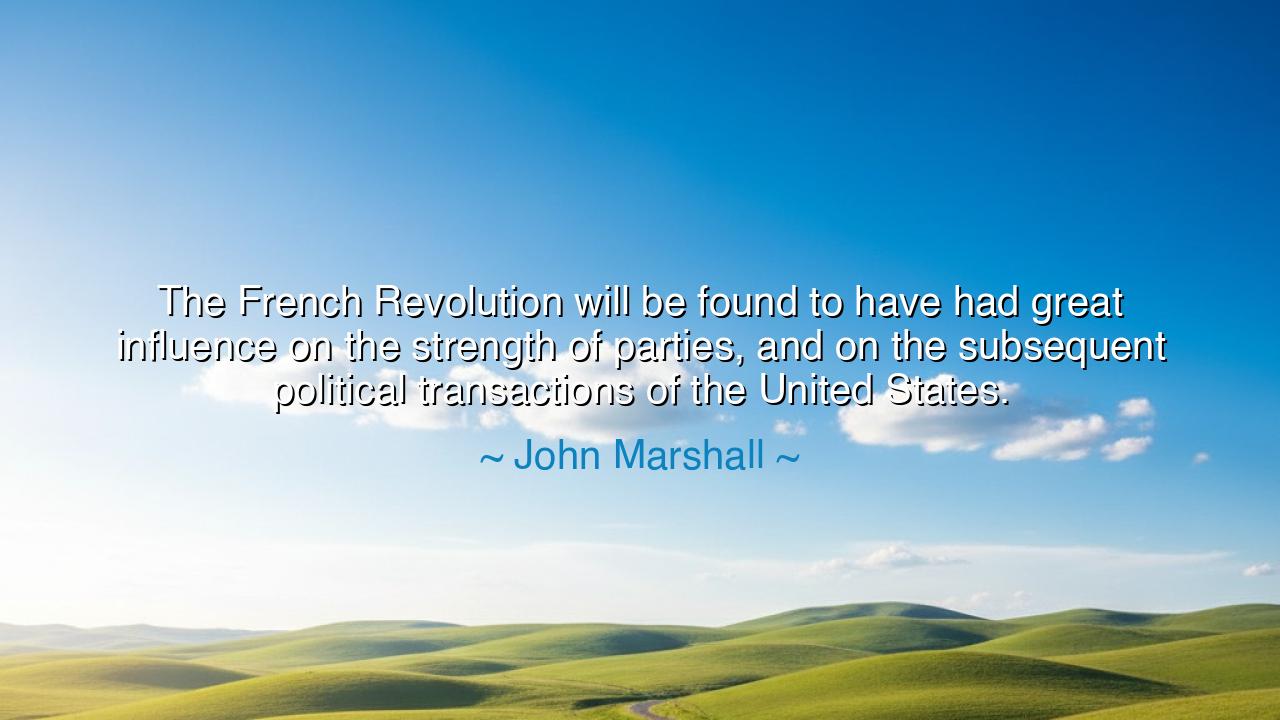
The French Revolution will be found to have had great influence
The French Revolution will be found to have had great influence on the strength of parties, and on the subsequent political transactions of the United States.






Hear the reflective words of John Marshall, Chief Justice of the early American republic: “The French Revolution will be found to have had great influence on the strength of parties, and on the subsequent political transactions of the United States.” These words, though wrapped in the calmness of history, strike with the thunder of truth. For the great convulsions of one nation seldom remain within its borders; the flames of revolution leap across oceans, and their sparks ignite the passions of distant peoples. What happened in France did not stay in France—it stirred the very soul of the young United States, deepening divisions, shaping parties, and setting the stage for generations of conflict and growth.
The French Revolution, with its cries of liberty, equality, and fraternity, was at first admired by many in America. After all, had not the United States itself just torn off the chains of monarchy in the name of freedom? Yet as the Revolution descended into blood, as the guillotine replaced the crown, Americans began to ask: was this the true path of liberty, or was it the descent into chaos? Thus was born a rift in the heart of the republic. Some, inspired by France, believed the Revolution to be the continuation of America’s own struggle; others recoiled, fearing that the same fire might consume their fragile new union.
This division gave birth to the strength of parties. On one side stood the Jeffersonians, who saw in France the spirit of democracy, a force against tyranny, and an ally in the struggle against aristocracy. On the other side stood the Federalists, led by men like Hamilton and Marshall himself, who warned that unchecked passion and radicalism could tear apart the delicate fabric of government. The debate was not merely about foreign affairs; it was about the very soul of America—whether its destiny lay with radical liberty or with ordered strength.
Consider the Genêt Affair of 1793, when the French envoy Edmond-Charles Genêt sought to rally Americans into supporting France against Britain, even attempting to raise private armies upon American soil. His actions inflamed passions and forced President Washington to assert America’s neutrality. Here we see how the French Revolution directly shook the United States, strengthening political factions. Federalists rallied to Washington’s caution, while Democratic-Republicans accused him of betraying liberty’s cause. The political transactions of America were forever altered, as parties hardened around these great questions.
John Marshall, who witnessed these struggles firsthand, understood that the Revolution in France had given shape and strength to America’s divisions. The disputes over foreign policy became the channels through which deeper arguments about the Constitution, the role of government, and the future of the republic flowed. Thus, the Revolution abroad became the crucible in which America’s first great party system was forged. And from these conflicts emerged not ruin, but growth—for in learning to contend with itself, America learned how to govern itself.
Understand then, O seeker, that no nation lives in isolation. The upheavals of one become the lessons, the warnings, the inspirations of another. The French Revolution, though oceans away, entered the heart of America and tested its unity. So too in our time, the storms of foreign lands reach our shores in ideas, in conflicts, in passions. We must be vigilant, discerning not only what to adopt, but what to resist. For the strength of parties, though dangerous, can also be a source of balance, if guided by wisdom and not by rage.
Therefore, take this lesson to heart: study the struggles of other peoples, for they hold mirrors to our own. Do not blindly follow, nor blindly reject, but learn. Know that every great upheaval abroad will echo at home, shaping your debates, your loyalties, your destiny. And remember that true strength lies not in silencing division, but in channeling it toward the common good.
Thus is the teaching of John Marshall: the French Revolution gave vigor to American parties, sharpened their conflicts, and steered the political transactions of the young republic. Let us see in this the eternal truth—that history is never the story of one nation alone, but of many threads woven together, each pulling and shaping the other. And let us be wise enough to draw from the struggles of others the lessons that keep our own house standing firm.






AAdministratorAdministrator
Welcome, honored guests. Please leave a comment, we will respond soon